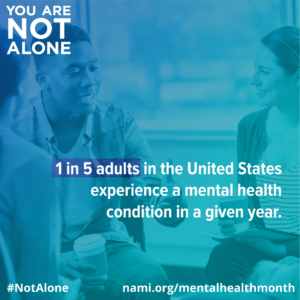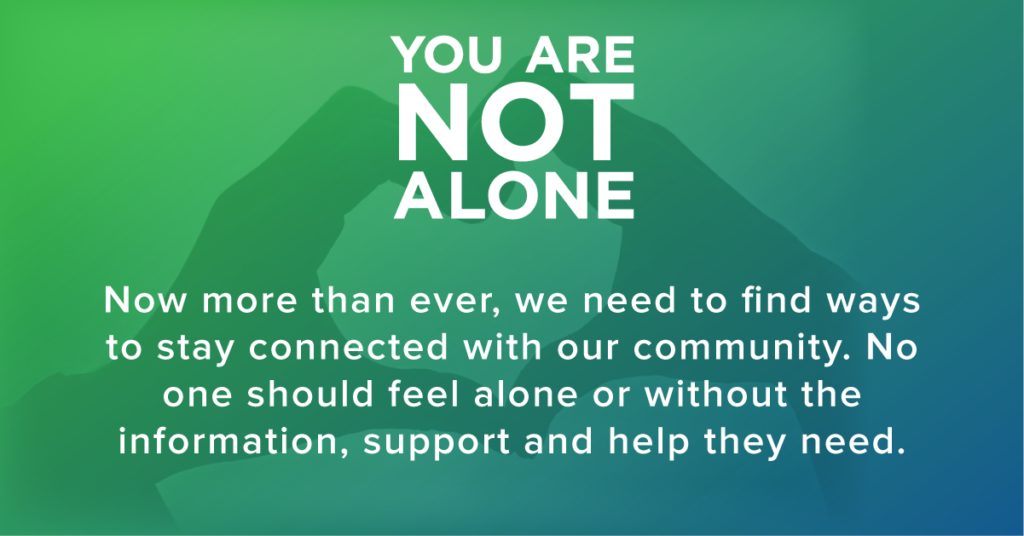“This Too Shall Pass” and “You Are Not Alone” are familiar phrases to members of the addiction and mental health recovery community. It’s fair to say that we’re living in a time when such mantras are more valuable than ever owing to the pandemic.
We are wise to remember that no matter how bleak the societal forecast looks, we shall overcome this public health crisis eventually. Such words may offer little solace to millions of Americans, but we have to hold on to hope and maintain a positive attitude. Remembering that we are all in this together can help to that end. While we may be ordered to stay at home and shelter in place, keeping in mind that you are not alone is beneficial.
COVID-19 is impacting everyone’s life, and the spread continues, as does the rising death toll. Those most vulnerable to the effects of isolation – those living with addiction and mental health disorders – are facing significant adversity.
Isolation begets loneliness; people in early and long-term recovery struggle dealing with both seclusion and sadness. Fellowship is what makes 12 Step recovery so effective for abstaining from drugs and alcohol and making progress in every sector of one’s life. No longer being physically connected to your support network can wreak havoc on your program, provided you don’t take precautions.
Warding off the sadness that accompanies feeling alone does not come easy for those in early addiction recovery. It takes time to develop coping mechanisms for contending with the discomfort that comes from hardship. Adopting healthy coping skills begins in treatment, but they are strengthened when you put them into practice in real-world situations. A pandemic is the severest example of a real-world situation.
Coping With Mental Health Symptoms in the Face of Fear and Isolation
Fear is one of the driving factors behind both use disorder and mental health symptoms. With 1,084,983 infected Americans and the death of 63,686 of our loved ones, it’s right to feel afraid. The fact that the death toll in less than three months is higher than that of all the Americans who died while serving in Vietnam, 58,220, over two decades is cause for concern.
Public health experts assure us that we can stave off contracting and transmitting the virus by following the CDC and WHO guidelines. Some of those include wearing face masks and latex gloves (Personal Protective Equipment) while in public. The more challenging recommendations are sheltering in place and self-quarantining (if you have or have come into contact with someone who has COVID-19). Adhering to the advice of the world’s leading health professionals should reduce some of your fears about contracting the coronavirus.
People living with mental illness or are in addiction recovery depend on connection with others. It’s critical that you continue attending your support groups and therapy sessions via teleconferencing and video conferencing. Call, facetime, or skype with people in your support network every day of the week, particularly if you are harboring negative thoughts.
Negativity can lead to ideations of self-destructive and self-defeating behaviors. If acted upon, you could slide backward in your recovery, lose progress, and potentially relapse. You can avoid all the above unfortunate byproducts of negative thoughts by digitally linking up with your friends and family.
The goal is to prevent fear, isolation, and loneliness from being the impetus for relapse or a resurgence of mental illness symptoms. Throughout the day, try to remind yourself that you are not alone, and this too shall pass.
Mental Health Awareness Month 2020
April was Stress Awareness Month and May is Mental Health Awareness Month; both observances could not have come at a better time. For the one in five Americans living with a mental health disorder, support is needed now more than ever. The same is especially true for the one in 25 adults who contend with a severe mental illness.
It is worth reiterating how vital it is to stay connected with each other and show support for the 47.6 million Americans dealing with conditions like anxiety, depression, bipolar, and post-traumatic stress disorder. More than half of our fellow members of the addiction recovery community also have a co-occurring mental health disorder.
It’s fitting that the theme of this year’s Mental Health Awareness Month is “You Are Not Alone.” This month, the National Alliance on Mental Illness (NAMI) will feature personal stories from people living with mental health conditions.
If you would like to share your story and help people feel less alone during these isolating times, then you can submit your story here. Your experience may brighten the lives of others who may be struggling to cope with our new normal. NAMI writes:
NAMI’s “You are Not Alone” campaign features the lived experience of people affected by mental illness to fight stigma, inspire others, and educate the broader public. Now more than ever before, it is important for the mental health community to come together and show the world that no one should ever feel alone. The campaign builds connection and increases awareness with the digital tools that make connection possible during a climate of physical distancing. Even in times of uncertainty, the NAMI community is always here, reminding everyone that you are not alone.
Mental Health Treatment for Adult Men
If you or an adult male you love is struggling with a mental illness, then please reach out to PACE Recovery Center. Our gender-specific facility specializes in treating men battling addiction or mental health disorders. Our team of physicians, doctorate-level clinicians, and master-level therapists help men get on the road to lasting recovery.
We want to share with you that our dedicated staff is taking every precaution to safeguard the health of our clients. If you would like to learn more about the COVID-19 response at PACE, then please click here.
Our thoughts, prayers, and sincerest condolences are with the millions of families who have lost loved ones to the coronavirus. We are hopeful that all the infected make a fast recovery.




